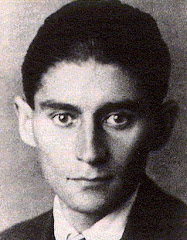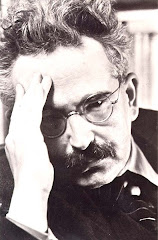A glimpse at the words "house" and "story" opens up some interesting thoughts:
The word "house" often enough, both in the Bible and in Homer, refers not only to a physical house in space but to a genealogy or a lineage across time as well. The House of Atreus and the House of David are prime examples. Whereas in a physical house, the entrances and exits of its residents do not affect its fate, in a genealogical house, if the members of the house leave the house or die out, the house itself crumbles. Thus, while in one sense of the word "house," the residents do not constitute the house as house, in the second sense of the word, they are the very materials out of which the house is built.
Now, we all know that a large house tends to have several stories, and that the residents of such a house rarely sleep on the first story. Taking "story," then, in its two senses, we come to the following: A large house possesses stories. As a physical fact, this is no marvel. The number of stories and even the plurality of stories does not impact the being or non-being of the house. But on a deeper level, on the level in which the house is not just a shelter from the elements but a shelter from the decay of time, stories are the mortar and cement that keep in place our lives which are the very bricks of the great structure.
The story/stories of the Jewish people, for example, is/are largely what keep/s the Jewish people alive, and what ensure/s that the house of David does not crumble. Physically and logically one would say that a house must exist for there to be stories, but temporally and thus existentially, one should say that for there to be a house there must be stories.
A story is never original, and yet it is always new. This is the metaphorical meaning of why the master of the house sleeps on the second floor. A story is always a commentary, and thus can never be the foundation, the house, but only a part of the house. A story is always grounded, framed, contextualized, inspired, etc. In the beginning, after all, was not a story, but a word, the word. The word is the house. (Heidegger states that "Language is the house in which Dasein poetically dwells). And it is no coincidence that in Hebrew, the Letter Hay which is said to be a holy letter because it frequently appears in the divine name/s also looks like a house, and comes from other Semitic alphabets in which the letter itself stood for the word "house." Yet the assembly of words, the ordering of them in chiasmus, antithesis, synthesis, or what have you, is the story without which the house could never stand. Words after all, only exist, because of the need and desire to communicate. And communicating is nothing less than storytelling. Even when I say, "Go to the store!" or "Did you go to the store?" I am telling a story. In the first case, I am telling the story of something that has not yet happened but something which I hope, through speech, to make happen. In the second case, I am telling the story, whose end awaits a response from the Other. For if the Other responds in the affirmative, then I have told a story whose conclusion is affirmative, and if negative, negative.
Thus, we see that the story, although it is not original in the sense of being primordial, functions as the ever dynamic layering of the house, whose continuous existence breaths life into its darkest corners, shielding it from demise.
The tower of Babel fell down. Yet, though the house of Babel fell, its stories continue. And thus, the house hasn't fallen, it has simply proven to be a house not of bricks, but of words. It is a house which extends not to the heavens but, even more miraculously, across time. Since languages continue to change, to grow, to die, but also to emerge, we can see that the tower of Babel is still being constructed, that the workers have not yet thrown in their working cards, but continue to toil. Each story builds upon the next, and thus the house that is humanity sits enthroned on the layers of its past. Proust says that the self is but a graveyard of all of its deceased selves, and archaeologists apply this very idea to the study of civilizations when they excavate the layers of history buried below ground. The tower of Babel towers over us in the towering image of history, a towering image, because it is imageless, as imageless as the imageless God. For that which is imageless, ungraspable, unfathomable, is also towering, the way that the galaxies millions of light years away tower over us, not because they appear big, but precisely because they don't, and their smallness, and invisibility (at least to the naked eye), suggests our own smallness.
In any event, we can see now why though the Jews have been homeless, they have not been without a house. The House of David (beit david) endured even when Jewish houses of worship and study (beit midrash and beit knesset) saw their fiery destruction, and even since the destruction of the Second Temple (The Beit Hamikdash, literally, the House of Holiness). Stories, therefore, are the lifeblood of the House. But stories are not mere words. They are the dialectic of words and memories.
Though I have seemingly asserted a dichotomy between the two notions of house and the uses story, it is not without saying that their difference is grounded in a unity, a unity which ambiguates the difference between body and soul, or existence and essence. For, on some level, it has been shown that all language, and thus all stories, are deictic. That is, are physical, are demonstrative and gestural. Every statement we make refers to a this or a not this, and every time we speak, we open our mouths. Indeed, every time we speak, we presuppose ourselves as selves and our interlocutors as not selves, and both require that we have an image of ourself and of the other. I, when I think about who I am, do not simply come up with a list of activities or attributes, but a picture or a video, at any rate, a characterization that not only includes but assumes my identity as a body, as a brown haired, brown-green-eyed, 180 lb. male with the build and glare of a 20 year old.
Thus, we see that the story and the house, in the sense in which I have expounded them, are not mere concepts, but things. And it is fitting that in Hebrew the word for word is the same as the word for thing. A world without words, without stories, is literally nothing.
Thursday, August 28, 2008
Subscribe to:
Post Comments (Atom)






No comments:
Post a Comment